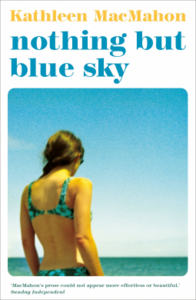You need to sign in or sign up before continuing.
Take a photo of a barcode or cover
Balled my eyes out
grief hitting me like a wave
Damn it David
but also good for you David
We all need some more Mary rose
in our lives
grief hitting me like a wave
Damn it David
but also good for you David
We all need some more Mary rose
in our lives
slow-paced
Interesting book from the point of view of a widower looking back over his life with his wife. He’s learning to live again whilst at the holiday location he visited every year with his wife. It’s a nice portrayal of a marriage even though it’s far from perfect. The guy is pretty bad and came to the realisation that he hadn’t escaped his terrible upbringing as much as he thought he had
I'm beginning to understand that I love books about marriage. And "Nothing But Blue Sky" has everything that I love in books about marriage: questionable decisions, heartbreak, and intimacy. Although David was far from being a perfect protagonist and I tend to prefer female voices, it was very interesting to spend time inside his head and getting to know him. I especially liked how he never shied away from his own imperfections, and how, many times, he even reinforced them. Oh, and I also loved the summer vibes, who plucked me right out a handful of rainy days. Overall, this is an easy and enjoyable read that I highly recommend.
I loved this slow unfolding of the history of a marriage. Nothing but Blue Sky is quiet and thoughtful and very moving. I listened to the audio version, beautifully narrated by the Irish actor, Stephen Hogan. In the slight present-day story David has returned to Aiguaclara, a small Catalonian resort where he has holidayed for the past twenty years with his wife Mary Rose. Except that Mary Rose died in a plane crash about a year ago, and David has decided to return to this place - so familiar and yet now, without her, so different. David remembers his marriage, examines his and Mary Rose's differences, what they each hoped for, and what they both loved. He recalls his own difficult childhood and Mary Rose's family. There is nothing here that is surprising or terribly shocking, and I loved it.
emotional
reflective
slow-paced
Plot or Character Driven:
Character
Strong character development:
Yes
Loveable characters:
No
Diverse cast of characters:
No
Flaws of characters a main focus:
No
this book keep reminding me that woman are great, the way he describe his Mary rose and Deborah who's are great great friend. it's about grief, marriage and family.
Women's Prize Longlist 2021
Ist es euch auch schonmal passiert, dass euch ein Buch, das euch anfangs gar nicht gefallen hat, am Ende total überzeugen konnte?
Mein Nichtwarmwerden mit Nothing But Blue Sky lag in erster Linie an MacMahons Protagonist David (Ire, 51, Journalist), der mir einfach nicht sympathisch war.
"Don't be an arsehole", sagt seine Frau Mary Rose in zahlreichen Situationen. Und ich stimme ihr zu. Auf jeder zweiten Seite ertönt es in meinem Kopf: Ja, David, sei kein Arschloch. David ist selbstgerecht, geizig, zynisch, ekelt sich vor Mehrgewichtigen, wechselt im Gym sogar das Sportgerät, wenn jemand mit etwas mehr Hüftgold neben ihm trainieren will. Er sieht absichtlich das Schlechte in Menschen, ist kaum zu Mitleid fähig und hat diese Journalisten-Arroganz verinnerlicht, die ihn auf andere, vor allem handwerkliche, Jobs herabsehen lässt.
Seine Frau Mary Rose scheint das komplette Gegenteil zu sein: eine Heilige im Kostüm einer Kinderkrankenschwester. Als sie ohne Vorwarnung bei einem tragischen Unfall ums Leben kommt, gibt es niemanden mehr, der David daran erinnert, kein Arschloch zu sein.
Allein fährt er noch einmal an ihren Urlaubsort an der spanischen Costa Brava und lässt die gemeinsamen Ehejahre Revue passieren.
Kathleen MacMahons Protagonist ist so authentisch, dass ich teilweise vergaß, dass eine Frau dieses Buch geschrieben hat. Ihre Beobachtungsgabe für die allersubtilsten menschlichen Zwischentöne ist beachtlich. Die Beleuchtung einer Ehe voller Kompromisse und ungleicher Erwartungshaltungen (der Kinderwunsch ist bspw ein großes Thema) gelingt beeindruckend glaubwürdig und frei von jedem Kitsch.
Und als David sich selbst, seinen Beruf und seine Ehe immer intensiver und kritischer reflektiert, passiert ES plötzlich: Ich habe einen Draht zu ihm gefunden, empfinde das erste Mal Empathie und Mitgefühl. Im Englischen würde ich sagen: I didn't like him at first, but he started to grow on me.
Und genau deswegen ist MacMahon so ein Genie. Und ihr Buch so gut. Auf Englisch übrigens sehr anspruchsvoll und daher eher geübten Lesern zu empfehlen. Ich drücke die Daumen für eine Übersetzung
Ist es euch auch schonmal passiert, dass euch ein Buch, das euch anfangs gar nicht gefallen hat, am Ende total überzeugen konnte?
Mein Nichtwarmwerden mit Nothing But Blue Sky lag in erster Linie an MacMahons Protagonist David (Ire, 51, Journalist), der mir einfach nicht sympathisch war.
"Don't be an arsehole", sagt seine Frau Mary Rose in zahlreichen Situationen. Und ich stimme ihr zu. Auf jeder zweiten Seite ertönt es in meinem Kopf: Ja, David, sei kein Arschloch. David ist selbstgerecht, geizig, zynisch, ekelt sich vor Mehrgewichtigen, wechselt im Gym sogar das Sportgerät, wenn jemand mit etwas mehr Hüftgold neben ihm trainieren will. Er sieht absichtlich das Schlechte in Menschen, ist kaum zu Mitleid fähig und hat diese Journalisten-Arroganz verinnerlicht, die ihn auf andere, vor allem handwerkliche, Jobs herabsehen lässt.
Seine Frau Mary Rose scheint das komplette Gegenteil zu sein: eine Heilige im Kostüm einer Kinderkrankenschwester. Als sie ohne Vorwarnung bei einem tragischen Unfall ums Leben kommt, gibt es niemanden mehr, der David daran erinnert, kein Arschloch zu sein.
Allein fährt er noch einmal an ihren Urlaubsort an der spanischen Costa Brava und lässt die gemeinsamen Ehejahre Revue passieren.
Kathleen MacMahons Protagonist ist so authentisch, dass ich teilweise vergaß, dass eine Frau dieses Buch geschrieben hat. Ihre Beobachtungsgabe für die allersubtilsten menschlichen Zwischentöne ist beachtlich. Die Beleuchtung einer Ehe voller Kompromisse und ungleicher Erwartungshaltungen (der Kinderwunsch ist bspw ein großes Thema) gelingt beeindruckend glaubwürdig und frei von jedem Kitsch.
Und als David sich selbst, seinen Beruf und seine Ehe immer intensiver und kritischer reflektiert, passiert ES plötzlich: Ich habe einen Draht zu ihm gefunden, empfinde das erste Mal Empathie und Mitgefühl. Im Englischen würde ich sagen: I didn't like him at first, but he started to grow on me.
Und genau deswegen ist MacMahon so ein Genie. Und ihr Buch so gut. Auf Englisch übrigens sehr anspruchsvoll und daher eher geübten Lesern zu empfehlen. Ich drücke die Daumen für eine Übersetzung
Unfortunately for me, this book was more about David than Mary Rose. The ruminations on the intimacies of a relationship were interesting for the most part but though I'm a parent, I know many people who have hugely fulfilling lives without children so the ending here really disappointed me and felt something of s cop out tbh.
medium-paced
Plot or Character Driven:
Character
Strong character development:
No
Loveable characters:
No
Diverse cast of characters:
Yes
Flaws of characters a main focus:
Yes
I have so many thoughts about this book. Firstly, the main character David is so flawed as a husband that listening him recount his marriage after his wife has died is very painful. He's just insufferable, especially because even after her death, he doesn't seem to truly understand how ignorant he was to her and how often he overlooked her. I found this more upsetting than her death.
The blurb suggests that David 'figures out who Mary Rose really was and the secrets she kept', I found out next to nothing about Mary Rose and there was no secrets unearthed, except she wanted to volunteer abroad at some point, but even then I attribute that to the fact he just never listened to her enough to find this out when she was alive. The book is more so David on holiday talking about himself and his upbringing, I didn't take away any of his true feelings on grief. It sadly wasn't the tender story on marriage that I was expecting.
Another thing that I found particularly annoying was the author was constantly reminding us that David was in Aiguaclara, to the point that it's used multiple times in one paragraph. Although the book jumps time and locations, all the scenes set in Aiguclara are obvious due to the fact they're set on a holiday near a beach. It really takes you out of the story and replaces nearly all description of the scene.
This book has been on my shelf for years, I don't regret reading it but I came away just feeling so angry for how pointless the plot/book was in the end.
The blurb suggests that David 'figures out who Mary Rose really was and the secrets she kept', I found out next to nothing about Mary Rose and there was no secrets unearthed, except she wanted to volunteer abroad at some point, but even then I attribute that to the fact he just never listened to her enough to find this out when she was alive. The book is more so David on holiday talking about himself and his upbringing, I didn't take away any of his true feelings on grief. It sadly wasn't the tender story on marriage that I was expecting.
Another thing that I found particularly annoying was the author was constantly reminding us that David was in Aiguaclara, to the point that it's used multiple times in one paragraph. Although the book jumps time and locations, all the scenes set in Aiguclara are obvious due to the fact they're set on a holiday near a beach. It really takes you out of the story and replaces nearly all description of the scene.
This book has been on my shelf for years, I don't regret reading it but I came away just feeling so angry for how pointless the plot/book was in the end.
Graphic: Child death, Death






